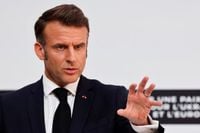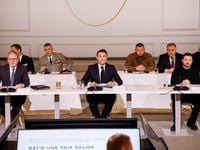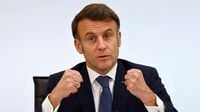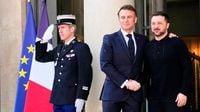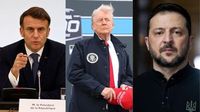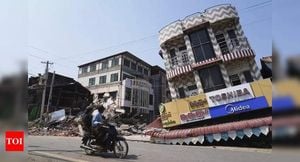French President Emmanuel Macron announced on Thursday, March 27, 2025, that France and the United Kingdom are leading efforts to deploy a "reassurance force" to Ukraine once hostilities with Russia come to an end. This initiative, which is a joint proposal from both nations, was welcomed by Ukraine during a summit in Paris attended by over two dozen countries supporting Ukraine.
"It does not have unanimity today, but we do not need unanimity to do this," Macron stated, emphasizing the urgency of the situation as Ukraine continues to face aggression from Russia. The summit, which included leaders from nearly 30 nations as well as NATO and EU chiefs, was held at a critical juncture in the ongoing war, which has now lasted over three years.
A Franco-British delegation is scheduled to visit Ukraine in the coming days to discuss the details of the proposed force, including potential deployment locations and the future structure of the Ukrainian army. Macron clarified that the proposed force would not act as peacekeepers or replace the Ukrainian military but would serve as a deterrent against any future Russian aggression.
During the summit, Macron acknowledged that not all European allies would participate in this initiative, citing both capacity issues and political reluctance among some nations. The discussions highlighted the differing views among Ukraine's partners, with Italian Prime Minister Giorgia Meloni stating that "no national participation in a possible military force on the ground is planned," while Czech Prime Minister Petr Fiala deemed it "premature" to discuss sending troops before the conditions of any ceasefire are established.
UK Prime Minister Keir Starmer joined Macron in agreeing to co-lead a "coalition of action for stable and durable peace" in Europe. The delegation will also explore strategies to strengthen Ukraine’s military capabilities for the post-war period, ensuring that it remains well-equipped for future challenges.
As the summit unfolded, reports emerged of ongoing violence in Ukraine, with Russian drone attacks injuring over 20 people and heavy shelling in Kherson resulting in one fatality and widespread power outages. This violence underscores the urgency of the discussions taking place among European leaders.
The proposed reassurance force, which could involve between 10,000 to 30,000 troops, aims to provide a credible deterrent against any renewed Russian aggression. The UK and French military officials are currently working with Ukraine to determine the optimal deployment of these troops.
Macron emphasized that the reassurance force would not engage in frontline operations but would instead be positioned in key strategic locations across Ukraine. He stated that if Russia were to launch a general aggression against Ukraine, the forces would be considered under attack, triggering a response based on the commander in chief's directives.
In light of the ongoing conflict, Macron has committed an additional 2 billion euros ($2.16 billion) in military support for Ukraine, which includes missiles, warplanes, and air defense systems. This funding is part of a broader strategy to bolster Ukraine’s defenses as it continues to seek a ceasefire with Russia.
Despite the ongoing diplomatic efforts, the situation remains precarious. Russia has been accused of stalling peace negotiations while continuing its military operations. Macron and Starmer both expressed frustration with Russia's tactics, suggesting that the nation is merely playing for time while it continues its illegal invasion.
The summit also resulted in a consensus among European leaders to maintain and potentially increase sanctions against Russia. Starmer noted, "Lifting sanctions on Russia right now would be a disaster for diplomacy," emphasizing that sanctions are vital tools for pressuring Russia into serious negotiations.
Ukrainian President Volodymyr Zelenskyy, who participated in the summit, echoed this sentiment, asserting that sanctions are one of the few effective means to compel Russia to engage in meaningful talks. He also criticized any suggestions of easing sanctions, stating that such actions would only serve to embolden Russia.
As the leaders discussed the future of Ukraine, Zelenskyy highlighted the importance of a robust and well-equipped Ukrainian military, stating, "Europe knows how to defend itself. We must prove it." His comments reflect the growing sentiment among European nations that they must take greater responsibility for their security in the face of ongoing threats.
Looking ahead, Macron indicated that the reassurance force could take shape within the next three to four weeks, signaling a commitment to moving forward despite the lack of unanimous support from all European allies. The Franco-British delegation's upcoming visit to Ukraine aims to solidify plans and outline the future of Ukraine's military in a post-war context.
As the conflict continues and diplomatic efforts intensify, the proposed reassurance force stands as a crucial element in Europe's strategy to secure peace in Ukraine and deter further Russian aggression. The coming weeks will be pivotal in determining the structure and effectiveness of this initiative, as well as the broader response of European nations to the ongoing crisis.
